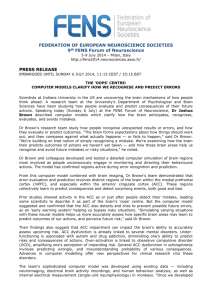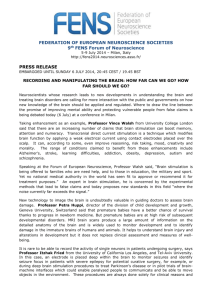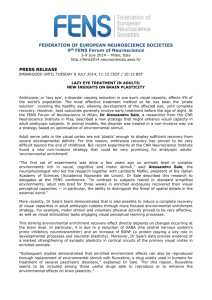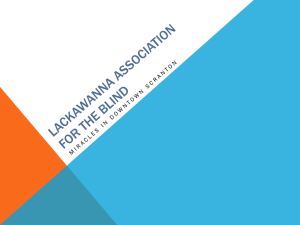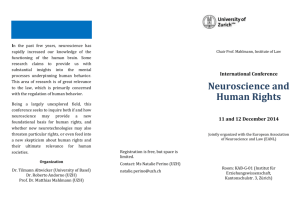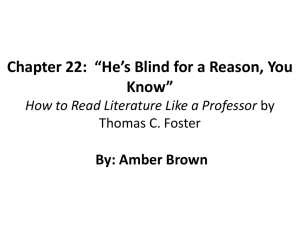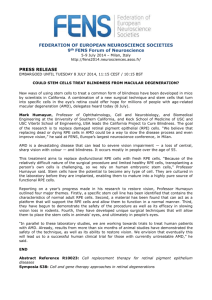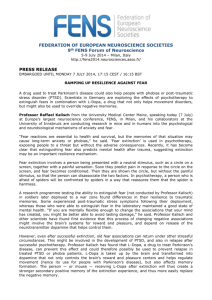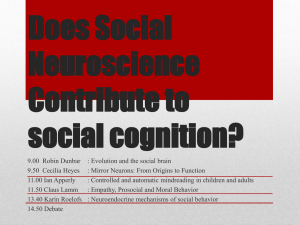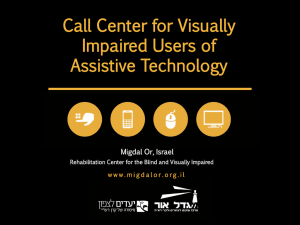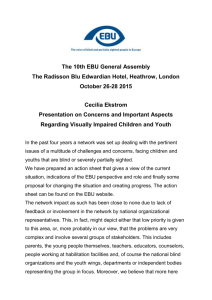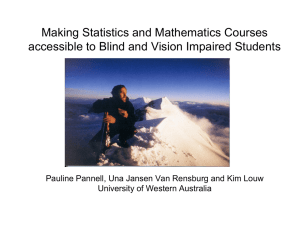blind people`s sixth sense? probably not
advertisement
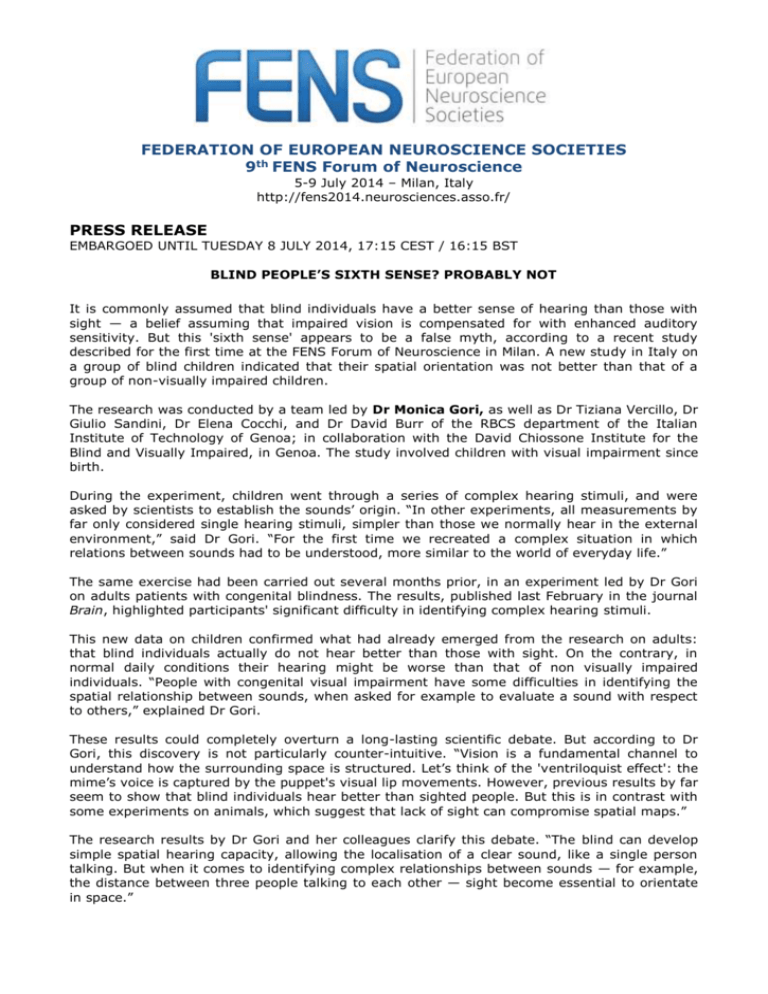
FEDERATION OF EUROPEAN NEUROSCIENCE SOCIETIES 9th FENS Forum of Neuroscience 5-9 July 2014 – Milan, Italy http://fens2014.neurosciences.asso.fr/ PRESS RELEASE EMBARGOED UNTIL TUESDAY 8 JULY 2014, 17:15 CEST / 16:15 BST BLIND PEOPLE’S SIXTH SENSE? PROBABLY NOT It is commonly assumed that blind individuals have a better sense of hearing than those with sight — a belief assuming that impaired vision is compensated for with enhanced auditory sensitivity. But this 'sixth sense' appears to be a false myth, according to a recent study described for the first time at the FENS Forum of Neuroscience in Milan. A new study in Italy on a group of blind children indicated that their spatial orientation was not better than that of a group of non-visually impaired children. The research was conducted by a team led by Dr Monica Gori, as well as Dr Tiziana Vercillo, Dr Giulio Sandini, Dr Elena Cocchi, and Dr David Burr of the RBCS department of the Italian Institute of Technology of Genoa; in collaboration with the David Chiossone Institute for the Blind and Visually Impaired, in Genoa. The study involved children with visual impairment since birth. During the experiment, children went through a series of complex hearing stimuli, and were asked by scientists to establish the sounds’ origin. “In other experiments, all measurements by far only considered single hearing stimuli, simpler than those we normally hear in the external environment,” said Dr Gori. “For the first time we recreated a complex situation in which relations between sounds had to be understood, more similar to the world of everyday life.” The same exercise had been carried out several months prior, in an experiment led by Dr Gori on adults patients with congenital blindness. The results, published last February in the journal Brain, highlighted participants' significant difficulty in identifying complex hearing stimuli. This new data on children confirmed what had already emerged from the research on adults: that blind individuals actually do not hear better than those with sight. On the contrary, in normal daily conditions their hearing might be worse than that of non visually impaired individuals. “People with congenital visual impairment have some difficulties in identifying the spatial relationship between sounds, when asked for example to evaluate a sound with respect to others,” explained Dr Gori. These results could completely overturn a long-lasting scientific debate. But according to Dr Gori, this discovery is not particularly counter-intuitive. “Vision is a fundamental channel to understand how the surrounding space is structured. Let’s think of the 'ventriloquist effect': the mime’s voice is captured by the puppet's visual lip movements. However, previous results by far seem to show that blind individuals hear better than sighted people. But this is in contrast with some experiments on animals, which suggest that lack of sight can compromise spatial maps.” The research results by Dr Gori and her colleagues clarify this debate. “The blind can develop simple spatial hearing capacity, allowing the localisation of a clear sound, like a single person talking. But when it comes to identifying complex relationships between sounds — for example, the distance between three people talking to each other — sight become essential to orientate in space.” ABBI PROJECT Data collected by Dr Gori’s team could lead to new and more effective rehabilitation treatment. This belief led to a new European project: Audio Bracelet for Blind Interaction (www.abbiproject.eu). The project's core idea is based on a new understanding of the role of vision in the development of children with and without visual disability: that audio feedback on body movements might help build a sense of space. The main method achieving this objective is the Audio Bracelet for Blind Interactions (ABBI), a device providing spatial information on where and how a movement is occurring. It is hoped that using ABBI should provide important information for posture control, motor coordination, spatial orientation, and social interaction — reducing the risk of exclusion for visually disabled individuals. Unlike most existing sensory substitution devices introduced in late childhood or adulthood, the approach proposed in ABBI does not require learning new 'languages', and it can be applied in the first years of life. The project, coordinated by Dr Gori, was created from a collaboration of five European centres, including the Italian Institute of Technology and the David Chiossone Institute in Genoa. Within the next three years, the project will manage rehabilitation of more than 50 visually impaired children from the first year of age. END Abstract Reference R10254: The role of multi-sensory interactions in sensory calibration Symposia S47: What does cross-modal plasticity tell us about the way the senses interact during development? Contact FENS Press Office and all media enquiries: Elaine Snell, Snell Communications Ltd, London UK (English language) tel: +44 (0)20 7738 0424 or mobile +44 (0)7973 953 794 email: Elaine@snell-communications.net Mauro Scanu (Italian language) tel: +39 333 161 5477 email: press.office@fens.org Dr Monica Gori Monica.Gori@iit.it NOTES TO EDITORS The 9th FENS Forum of Neuroscience, the largest basic neuroscience meeting in Europe, organised by FENS and hosted by the The Società Italiana di Neuroscienze (SINS) (Italian Society for Neuroscience) will attract an estimated 5,500 international delegates. The Federation of European Neuroscience Societies (FENS), founded in 1998, aims to advance research and education in neuroscience, representing neuroscience research in the European Commission and other granting bodies. FENS represents 42 national and mono-disciplinary neuroscience societies with close to 23,000 member scientists from 32 European countries. http://fens2014.neurosciences.asso.fr/
